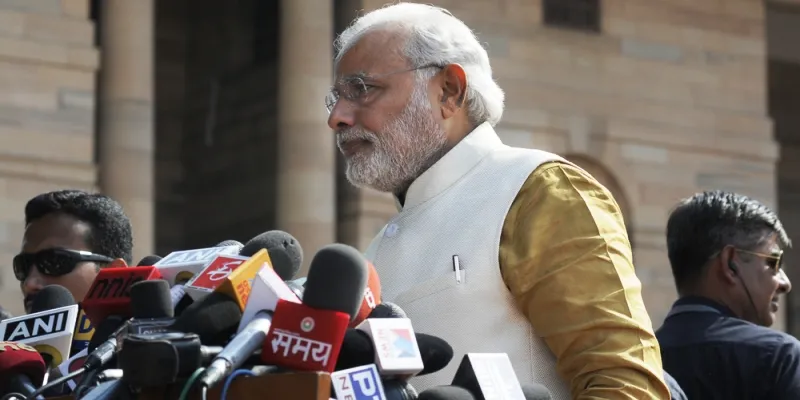Modi asks US media honchos to keep regional languages in mind before their foray into India
Describing India as the "biggest market", America's media honchos have called for speedier digitisation of the Indian system, including early expansion of the 4G network, during a one-of-its kind meeting with the Indian Prime Minister Narendra Modi in New York.

During the meeting wherein the focus was on the role that the media and entertainment industry can play in development and generation of employment opportunities in the country, CEOs of the top media houses appreciated Modi for "energetic and dynamic leadership" and expressed optimism about the future of India, a statement said.
The CEOs representing 40 per cent of the world's entertainment industry were enthusiastic about the digital transformation that is taking place in India through the 'Digital India' initiative.
They said that the current strong trajectory of the Indian economy makes it at a unique moment to accelerate growth in this sector.
The CEOs present included Rupert Murdoch, Executive Chairman News Corp and 21stCentury Fox; James Murdoch, CEO, 21st Century Fox; Robert Thompson, CEO, News Corp; Uday Shankar, CEO, Star India; David Zaslav, President and CEO, Discovery Communications, and Michael Lynton, CEO, Sony Entertainment.
Others present at the round table were Michael Roth, CEO, Interpublic Group of Companies; Shane Smith, CEO, Vice Media; Martin Sorrell, CEO, WPP; Jeff Bewkes, CEO, Time Warner; Nancy Dubuc, CEO, A&E Networks; Anthony Pratt, Chairman, Visy Industries; William Duhamel, Route One Investment Company, and Jeff Ubben, CEO of ValueAct Capital.
"All of them said India is the biggest market for them in terms of the phenomenal growth of the entertainment channels, in terms of the youth in India wanting more such content. They asked for speedier digitisation of the Indian systems," External Affairs Minister spokesperson Vikas Swarup told reporters.
Shane Smith, for instance, said that he wanted as soon as possible rolling of the 4G systems. This is the bandwidth that they need for their program contents to be rolled out and to reach people as fast as possible.
All the CEOs said that India is already a big market for them and they do not have any issues with the existing norms.
"What they wanted was speedier expansion of broad band infrastructure," he said. .
"The Prime Minister and CEOs observed that the changes in technology and media in recent times have led to an enormous democratisation of knowledge. He said that the world is now in a technology-driven era, where growth of digital infrastructure is as important as growth of physical infrastructure," Swarup said.
Suggesting to the CEOs that India represents both the biggest opportunity and the biggest challenge for them, Modi asked them to keep regional languages in mind, as they develop their content and firm up investment plans for India.
Modi spoke of his government's vision for Digital India, the plan to connect 600,000 villages through broadband connectivity.
He asked the CEOs to visualise the citizen of the 21st century, and think about what values they will represent and what challenges they will face.
Speaking about the role that digital technology can play in human resource development, the Prime Minister emphasised that he saw a key role for digital technology in further strengthening democracy, and in India’s development narrative.
Modi also gave a number of suggestions in terms of how media and communications companies can be part of India’s development story.
One of the ideas he floated was that of setting up of a communications university in India, Swarup said.
Another aspect that came out during the round table that digital technologies and mobile platforms provided opportunity for democratisation of access to media for inclusion and empowerment and therefore building of more infrastructures would be a critical element of the both process in the coming years, said the Indian Ambassador to the US, Arun K Singh.
There was discussion of how media could be a partner in India's developmental agenda.
Responding to a question, Swarup said there was no mention of increasing the current 26 per cent cap on foreign direct investment (FDI) in the media sector.
Image Credit: Shutterstock
Read More:
‘Start-Up India, Stand-Up India’, urges Narendra Modi
Modi’s US visit will focus on innovation, digital economy







